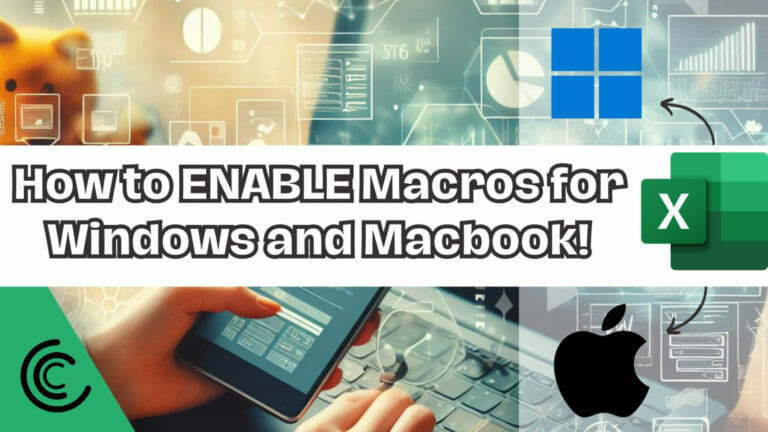A user authentication service is a system or platform that verifies and validates the identity of users attempting to access a particular application, system, or network. The primary goal of user authentication is to ensure that individuals accessing a resource are who they claim to be and to safeguard against unauthorized access.
Examples of user authentication services include Active Directory for Windows environments, OAuth for web-based applications, and identity providers like Okta, Auth0, or Firebase Authentication for cloud-based services.
Apparently, security is a hot topic nowadays, my friends’ insta is getting hacked, they’re losing access to mail ids and all, it really is scary to be very honest, so i decided to take some topics related to authentication and here I am : )

Table of Contents
Why is user authentication important?
User authentication is crucial for security. It prevents unauthorized access to sensitive information, systems, or networks. By verifying user identities, it ensures that only authorized individuals have access to specific resources, protecting against data breaches and unauthorized activities.
What are the common methods of user authentication?
Common methods include:
- Passwords: Users enter a secret code.
- Biometrics: Authentication using physical or behavioral characteristics (fingerprint, face recognition).
- Two-Factor Authentication (2FA): Requires two forms of identification, often a password and a temporary code.
How does Multi-Factor Authentication (MFA) enhance security?
MFA adds an extra layer of security by requiring users to provide multiple forms of identification. Even if one factor (e.g., a password) is compromised, the additional factor(s) add an extra barrier, reducing the risk of unauthorized access.
Can User Authentication Service tools be used for remote access?
Yes, many User Authentication Service tools support remote access. Users can authenticate themselves to access systems, applications, or networks from locations outside the organization’s physical premises.
Are these tools compatible with different devices and platforms?
Many User Authentication Service tools are designed to be compatible with various devices and platforms. They offer flexibility to support different operating systems, web browsers, and mobile devices for a seamless user experience.
How do these tools handle user data privacy and security?
User Authentication Service tools prioritize user data privacy and security. They often employ encryption, secure protocols, and secure storage practices to safeguard user information from unauthorized access or breaches.
Also Read ➤ ➤
10 BEST Discord Voice Changer Software | DIVE into WORLD of MEMES NOW!
The Main Agenda – Top 10 User Authentication Service

Auth0
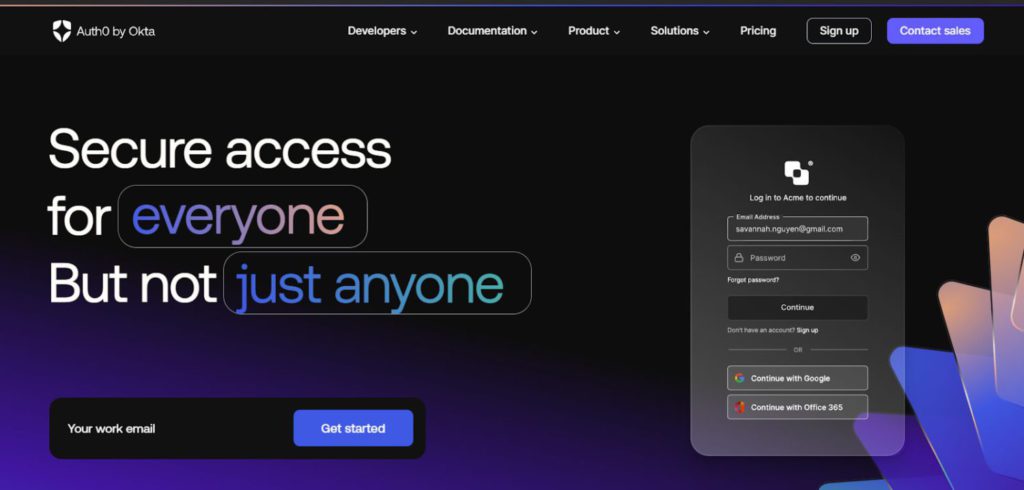
Auth0 is a comprehensive user authentication and authorization platform known for its simplicity and scalability. It provides developers with the tools needed to secure access to applications and APIs. Auth0 supports a variety of identity providers, social logins, and multi-factor authentication, making it a versatile solution for businesses of all sizes. One of Auth0’s unique points is its “Universal Login” feature, offering customizable login pages to provide a seamless and branded user experience. Additionally, Auth0’s extensibility through custom JavaScript rules allows organizations to tailor authentication workflows to their specific needs.
Pros and Cons:
Auth0’s strengths lie in its ease of integration, flexibility, and support for various identity providers. It offers a free tier for developers and small projects, making it accessible. However, some users have noted that the pricing can become steep as usage scales, and the learning curve may be challenging for those new to identity management. Despite these considerations, Auth0’s extensive documentation and community support contribute to its overall positive reputation in the authentication space.
Ping Identity
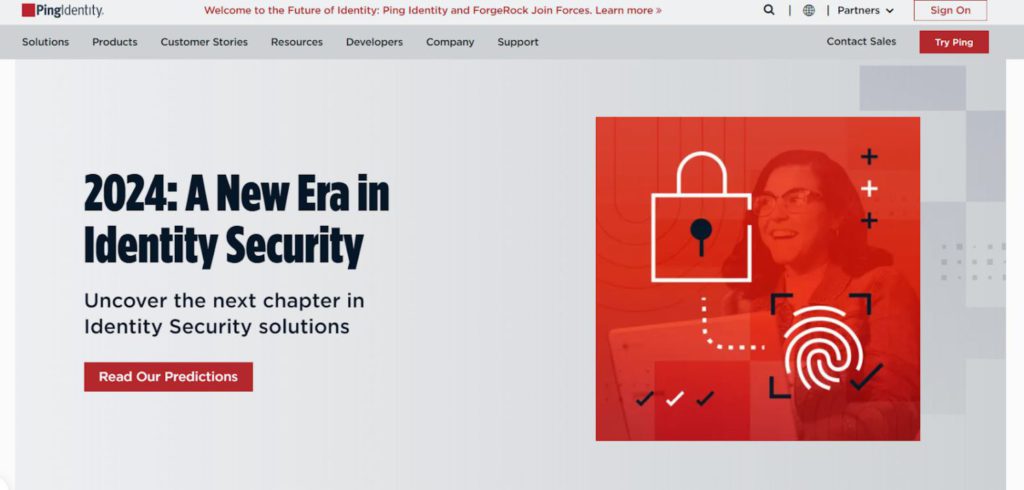
Ping Identity is a prominent identity and access management solution providing Single Sign-On (SSO), Multi-Factor Authentication (MFA), and other security features. Ping Identity stands out for its robust capabilities in securing digital identities and ensuring secure access across various applications. Its unique point includes its Adaptive Authentication feature, which leverages contextual information to dynamically adjust the level of authentication required based on the user’s behavior and environment.
Pros and Cons:
Ping Identity is recognized for its comprehensive identity solutions and strong emphasis on security. It offers seamless integration with various applications and environments. However, some users have highlighted that the initial setup may be complex, and the licensing costs could be higher compared to other solutions. Ping Identity’s ability to cater to complex enterprise needs makes it a preferred choice, though organizations should carefully evaluate their requirements and budget considerations.
Also Read ➤ ➤
10 Best Customer Experience Management Software | DELVE NOW!
Okta
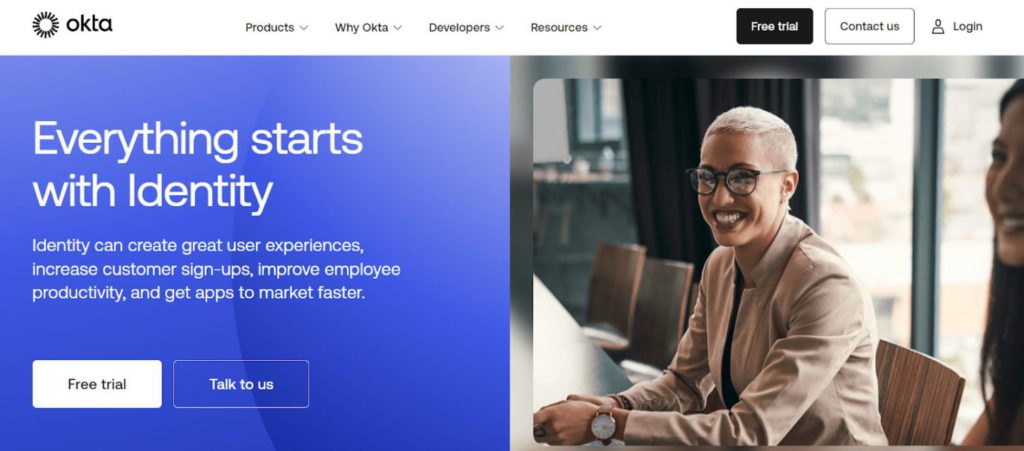
Okta is a leading cloud-based identity and access management platform designed to secure and streamline user authentication processes. It offers a unified solution for managing user identities, providing Single Sign-On (SSO), Multi-Factor Authentication (MFA), and lifecycle management features. Okta’s uniqueness lies in its ability to integrate with a wide range of applications and systems, making it a versatile choice for organizations with diverse technology stacks. The platform supports both workforce and customer identity use cases, catering to enterprises of varying sizes. Okta’s Adaptive MFA uses contextual information to assess risk and dynamically adjust authentication requirements, enhancing security.
Pros and Cons:
Okta is praised for its user-friendly interface, rapid deployment capabilities, and robust security features. It supports a vast number of pre-built integrations, allowing organizations to connect with popular third-party applications effortlessly. Okta’s comprehensive identity platform simplifies user management across various environments. However, some users have noted that Okta’s pricing may be relatively higher, especially for smaller businesses. Additionally, while Okta provides extensive documentation, organizations might need to invest time in configuring and customizing the platform to align with their specific needs. Overall, Okta’s strengths lie in its scalability, security, and broad compatibility with a multitude of applications.
Duo Security
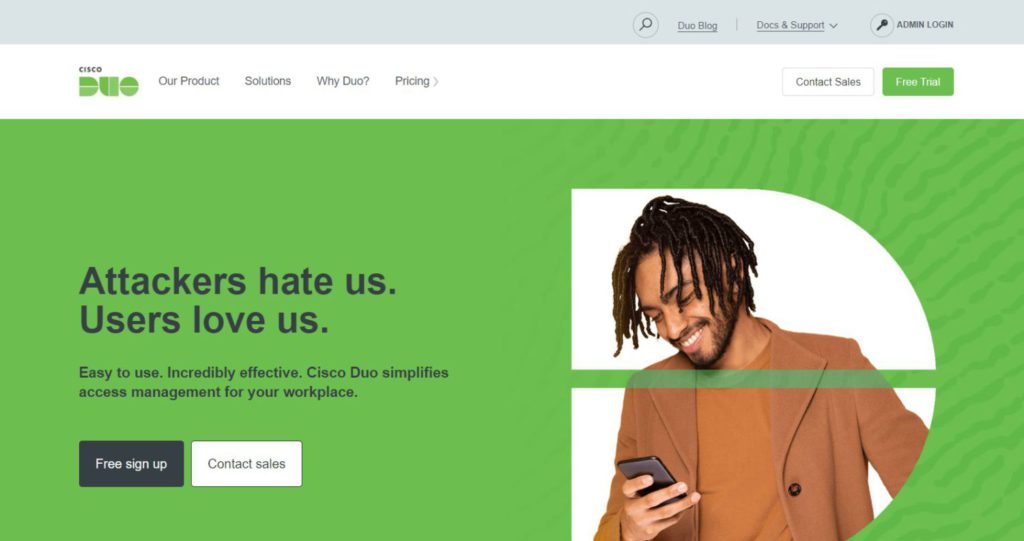
Duo Security, now a part of Cisco, is a user authentication and access management platform that focuses on enhancing security through Multi-Factor Authentication (MFA). Duo is renowned for its simplicity and effectiveness in providing an additional layer of authentication beyond passwords. One unique point of Duo is its push-based authentication, allowing users to confirm their identity with a simple tap on their mobile devices. Duo’s approach aligns with a zero-trust security model, emphasizing continuous verification of user identities.
Pros and Cons:
Duo Security’s standout feature is its straightforward implementation of MFA, enhancing security without introducing complexity. The platform supports various authentication methods, including push notifications, time-based passcodes, and hardware tokens. Duo’s wide range of integrations and compatibility with different devices make it adaptable to diverse IT environments. However, some users have mentioned that the user interface may lack advanced customization options, and certain advanced features may require additional licensing. Overall, Duo Security excels in providing a reliable and user-friendly MFA solution, particularly suitable for organizations prioritizing ease of use and security.
Also Read ➤ ➤
Best “Who Called Me From This Phone Number” Free Lookup Companies | Claim a Stress Free Day NOW!
Thales SafeNet Trusted Access
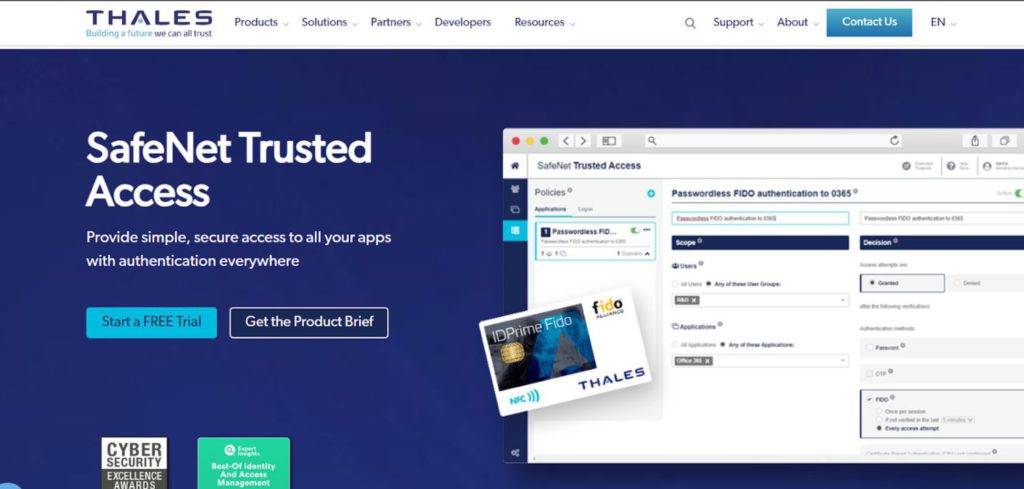
Thales SafeNet Trusted Access is an access management solution provided by Thales Group, a global leader in advanced technologies. This platform focuses on securing user identities and ensuring authorized access to applications and resources. Thales SafeNet Trusted Access employs a risk-based approach to authentication, leveraging factors such as device trustworthiness and user behavior to dynamically adjust access controls. The platform supports various authentication methods, including Multi-Factor Authentication (MFA) and Single Sign-On (SSO). Thales emphasizes a user-centric approach, aiming to balance security and user convenience.
Pros and Cons:
Thales SafeNet Trusted Access is recognized for its robust security measures and adaptive authentication capabilities. Its risk-based approach adds a layer of intelligence to access decisions, enhancing security without compromising user experience. Thales is suitable for businesses with complex security requirements and offers integrations with a range of applications. However, organizations may find that the extensive feature set comes with a steeper learning curve during implementation. Some users have also mentioned that the pricing structure could be complex, requiring careful consideration based on specific organizational needs. Overall, Thales SafeNet Trusted Access is well-regarded for its advanced security features and adaptability to diverse authentication scenarios.
Firebase Authentication
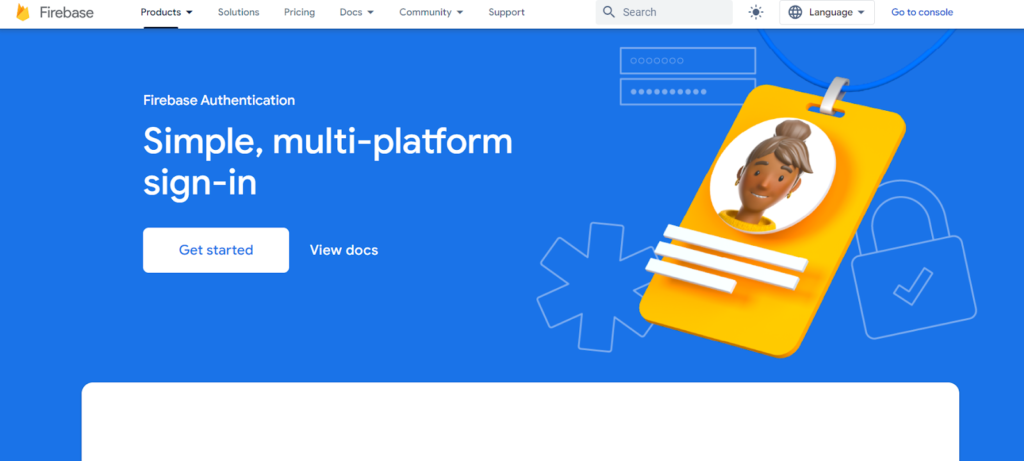
Firebase Authentication is part of the broader Firebase suite offered by Google, providing developers with a comprehensive set of tools for building and managing applications. Firebase Authentication focuses on simplifying the user authentication process for developers, offering easy-to-use SDKs and integrations with popular identity providers like Google, Facebook, and Apple. One unique aspect of Firebase Authentication is its real-time updates, allowing developers to observe changes in a user’s authentication state in real time. The platform supports various authentication methods, including email/password, phone number, and third-party identity providers.
Pros and Cons:
Firebase Authentication stands out for its simplicity and ease of integration, making it an attractive choice for developers, especially those working on mobile and web applications. The real-time updates provide a seamless experience for managing user authentication states. Firebase Authentication is well-documented, and the free tier makes it accessible for small to medium-sized projects. However, some users have noted limitations in terms of advanced customization options, which might be a consideration for projects with specific authentication requirements. Additionally, organizations using Firebase Authentication should be mindful of potential costs as the application scales, as certain features may fall under a pricing tier. Overall, Firebase Authentication excels in providing a straightforward solution for developers seeking efficient and scalable user authentication.
Also Read ➤ ➤
The Best 10 Voice Recognition Softwares | SUPER GUIDE!
AWS Cognito
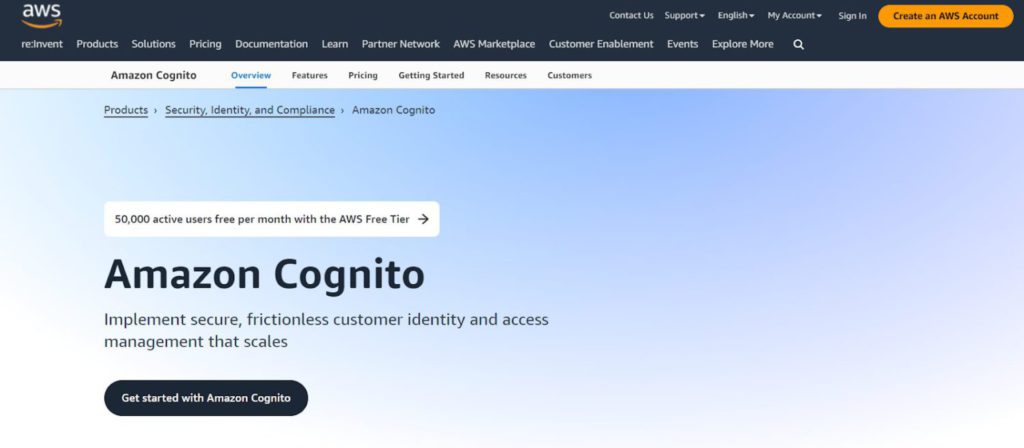
Amazon Cognito, part of Amazon Web Services (AWS), is a comprehensive cloud-based service for handling user identities and authentication in applications. Designed with a focus on scalability and security, AWS Cognito provides developers with the tools to manage user sign-ups and sign-ins easily. It supports various identity providers, including social identity providers like Google and Facebook. One notable feature is its integration with AWS Lambda, enabling developers to execute custom authentication flows. AWS Cognito also provides features like Multi-Factor Authentication (MFA), user attribute verification, and the ability to synchronize user data across devices.
Pros and Cons:
AWS Cognito is favored for its seamless integration with other AWS services, making it a robust choice for developers working within the AWS ecosystem. Its scalability is a significant advantage, allowing applications to handle a growing number of users effortlessly. Developers appreciate the flexibility provided by custom authentication flows using AWS Lambda functions. On the flip side, some users have found the learning curve to be steep, particularly for those new to AWS services. Additionally, while the free tier offers a certain level of usage, costs can increase with scale, and users should carefully assess their specific requirements against the pricing model. Overall, AWS Cognito is a powerful solution for cloud-based user authentication, particularly for applications hosted on AWS infrastructure.
Microsoft Azure Active Directory
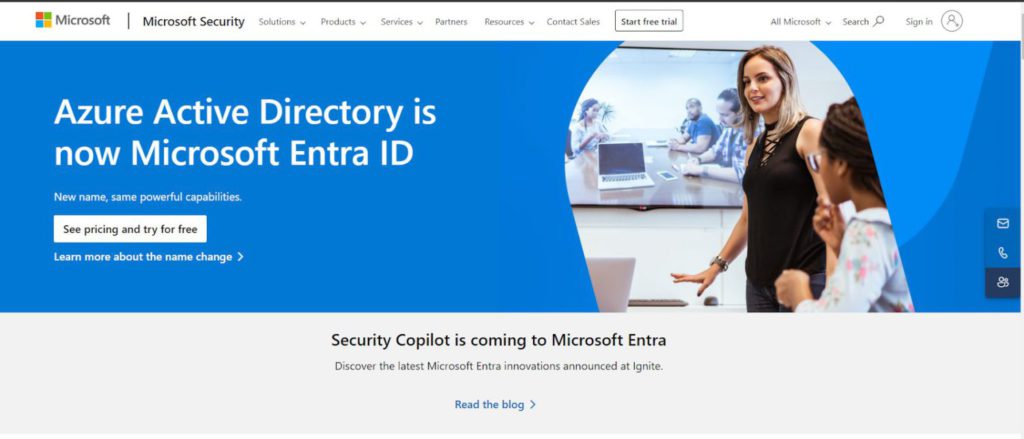
Microsoft Azure Active Directory (Azure AD) is a cloud-based identity and access management service from Microsoft’s Azure cloud platform. Azure AD provides a comprehensive solution for managing user identities and access to applications, whether they are on-premises or in the cloud. It supports Single Sign-On (SSO) for a wide range of applications and services, allowing users to access multiple resources with a single set of credentials. Azure AD offers features such as Multi-Factor Authentication (MFA), conditional access policies, and identity protection. It’s designed to integrate seamlessly with Microsoft 365 and other Microsoft services, making it a preferred choice for organizations using Microsoft’s ecosystem.
Pros and Cons:
Azure AD’s tight integration with Microsoft products is a significant advantage for organizations heavily invested in the Microsoft ecosystem. Its SSO capabilities contribute to a streamlined user experience, and the service supports a wide array of authentication protocols. Azure AD’s scalability ensures it can accommodate the needs of large enterprises. However, some users have reported complexity in setup and configuration, especially for organizations with diverse and complex IT environments. The service’s robust feature set can also be overwhelming for smaller businesses with simpler requirements. While Azure AD has a free tier, organizations should be mindful of potential costs, which may increase based on usage and additional features. Overall, Azure AD is a comprehensive solution for identity and access management, particularly for enterprises leveraging Microsoft technologies.
Also Read ➤ ➤ Best 10 FREE Transcription Tools – The Ultimate Guide!
Authenticator by LastPass
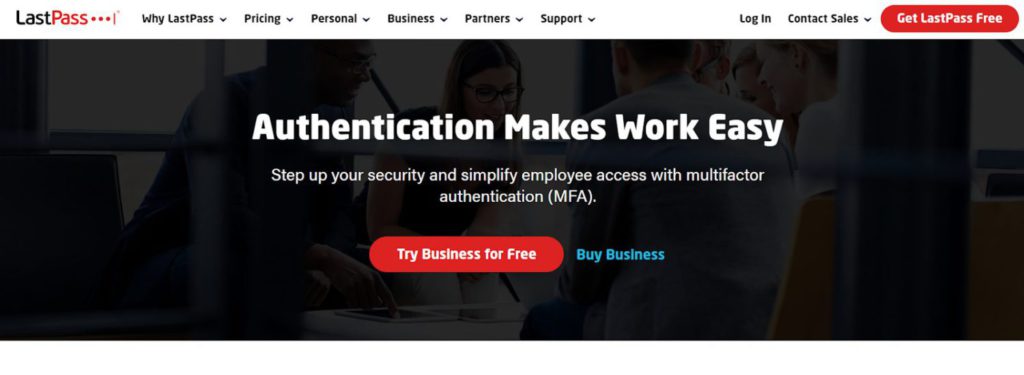
The LastPass Authenticator is a multifactor authentication (MFA) solution provided by LastPass, a well-known name in the password management and security industry. The Authenticator serves as an additional layer of security by generating time-based one-time passwords (TOTPs) that users can use during the login process. It supports various websites and applications, offering a convenient way for users to enhance the security of their accounts. One notable feature is its integration with LastPass’s broader suite of security tools, allowing users to centralize their password management and multifactor authentication within a single platform. The Authenticator is compatible with various platforms, including iOS and Android, making it accessible to a wide range of users.
Pros and Cons:
The LastPass Authenticator is praised for its user-friendly interface and seamless integration with the LastPass password manager. The ability to generate TOTPs for a variety of services enhances overall account security. The app also supports push notifications for quick and easy authentication. However, some users have reported occasional synchronization issues between the LastPass Authenticator and the LastPass password manager. Additionally, while the app is free to use, LastPass offers a premium version with advanced features, and users should assess whether the additional functionalities justify the premium subscription. Overall, LastPass Authenticator is a reliable MFA solution, especially for those already using LastPass for password management.
RSA SecurID
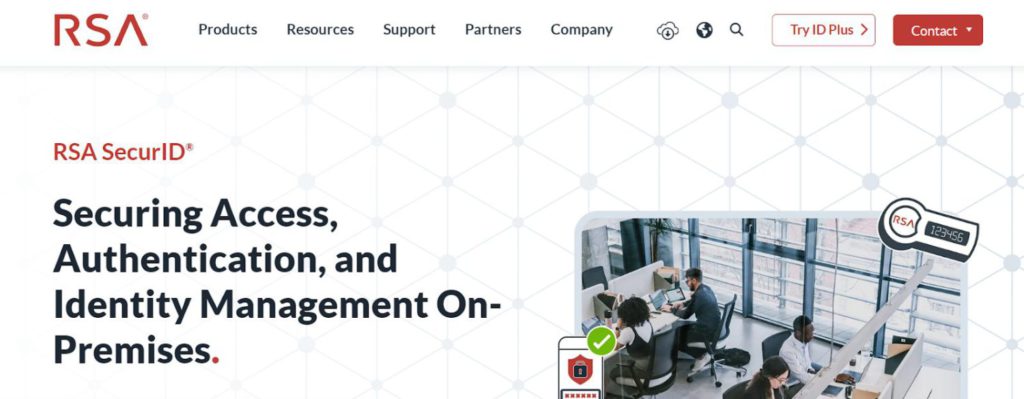
RSA SecurID is a widely recognized and trusted user authentication solution provided by RSA, a cybersecurity company. It employs the use of hardware or software tokens to generate one-time passcodes for users during the login process. The hardware tokens are physical devices, while software tokens can be installed on various devices, including smartphones. RSA SecurID is known for its strong security measures and has been a staple in enterprise environments for many years. The solution offers adaptive authentication, risk-based authentication, and the ability to integrate with various applications and systems for comprehensive identity and access management.
Pros and Cons:
RSA SecurID’s strength lies in its reputation for providing robust security measures, and its long-standing presence in the market instills confidence in many organizations. The adaptive and risk-based authentication features contribute to a dynamic and intelligent security posture. However, some users have noted that the physical hardware tokens can be inconvenient for end-users, and there may be additional costs associated with replacing lost or damaged tokens. The initial setup and configuration process can be complex, requiring careful planning. Additionally, the pricing structure may be a consideration for smaller businesses. In summary, RSA SecurID is a reliable and secure authentication solution, particularly suited for enterprise-level security needs.
Also Read ➤ ➤ Best PC Benchmark Software – Monitor your CPU performance NOW!
Conclusion
In conclusion, the realm of user authentication services plays a pivotal role in today’s digital landscape, addressing the critical need for safeguarding user identities and securing access to sensitive resources. As technology advances and cyber threats become more sophisticated, the importance of robust user authentication mechanisms cannot be overstated. The top 10 user authentication services discussed here offer a diverse range of features and capabilities, catering to the varying needs of organizations and developers.
Auth0 emerges as a standout choice, renowned for its simplicity, scalability, and support for various identity providers. Its “Universal Login” feature and extensibility through custom JavaScript rules add to its appeal. Ping Identity follows suit with comprehensive identity solutions and notable features like Adaptive Authentication. Okta distinguishes itself with its user-friendly interface, rapid deployment, and broad compatibility. Duo Security, with its focus on simplicity and effective Multi-Factor Authentication, stands out as a reliable choice, especially under Cisco’s umbrella.
Thales SafeNet Trusted Access adopts a risk-based approach, balancing security and user convenience. Firebase Authentication caters to developers with its simplicity, real-time updates, and integrations with major identity providers. AWS Cognito, deeply integrated into the AWS ecosystem, excels in scalability and flexibility. Microsoft Azure Active Directory proves advantageous for organizations within the Microsoft ecosystem, offering seamless integration and a comprehensive feature set. LastPass Authenticator provides an additional layer of security and integrates seamlessly with the LastPass password manager. Finally, RSA SecurID, a longstanding player, offers robust security measures suitable for enterprise-level needs.
While each service has its strengths, it’s crucial for organizations to carefully evaluate their specific requirements, budget considerations, and compatibility with existing systems. The choice of a user authentication service should align with the organization’s security policies, user experience expectations, and the scalability needed to accommodate future growth. As the landscape evolves, staying informed about the latest advancements in user authentication will be key to maintaining a secure and user-friendly digital environment.


